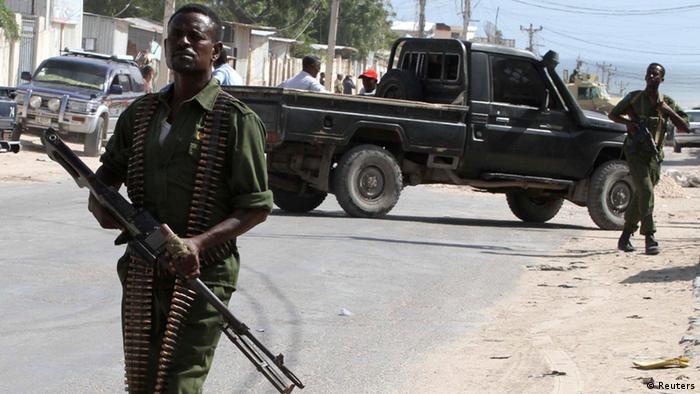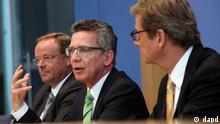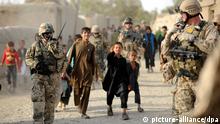News Global development Famine Guardian Global Development Top UN official warns of continued risk of famine in Somalia Mark Bowden, who leads the UN relief efforts in Somalia, says many people remain in a precarious position and would need assistance on a regular basis reddit this Mark Tran guardian.co.uk, Monday 16 January 2012 13.15 GMT Article history MDG : Famine in Horn of Africa : IDP arriving in Mogasishu , Somalia. Displaced Somalis who had fled famine prepare to leave an IDP camp in Mogadishu last week to resettle back in their respective home regions. Photograph: Mohamed Abdiwahab/AFP/Getty Images
Amanuel Hidrat
The biological clock (body clock) is always ticking. How fast it ticks depend on the combination of genetic and environment. Both our experience and behaviors influence the speed at which the clock ticks. By the same token political leaders have their own ticking clock designed to optimize the survival of their political agendas. I am talking about the giant clock of peaceful co-existence the late Prime Minister Meles Zenawi had set on his desk to remind his vision every time he came to his office. The clock that reminds him how far he went in that journey and all the projects and thoughts set to pave the way to peaceful co-existence. It was a journey for a new beginning and new history making. I hope the clock has a good durable battery with the new occupant of the seat. I started to collect up all the parts of his impressive steps of building relationships that no one have thought after the bloody war of 1998-2000.
For normal visionary leaders, searching solutions for intractable problems is anything, but routine. Tales of legendary leaders and coaches are filtered through the ticking clock in their offices as to how they manage their time of leadership – not only for fueling perceptions of comfortable fit as team players, but also to mange the efficacy of their selling point for their agendas. When a team of leadership speaks the same language and view through a shared lens to the political landscape they are in, they will find themselves in a familiar world, even under the most unusual circumstances; and that is to show the willingness to confront the major anxiety of their people.
Beyond the circumscribed saturated national politics and polemical purposes, Eritrean scholars and professionals must make an effort to escape from fictionalization endeavors and myth making that congeals sour view on the politics of the horn. Our views on the larger trajectory should embrace all competing supplementary or complementary visions to resolve the whole issue of the region, changing the national character to regional scale to facilitate the integration of regional policies for the purposes of peace and developments.
In this essay I will explore the idea of political heterodoxy – the concept of variety opinions that conjectures to light through analytical digression and expose the hypocrisies of popular opinions and the psychology of conformism, while searching political alternatives in the horn of Africa by shifting sets of conceptual and meta-theoretical debates. However, in the process we can exercise the discipline of science as to how systematically exclude implausible knowledge claimed within the boundaries of our arguments. Besides, we will see how narrow nationalism becomes a setback in the politics of “regional citizenship”.
Building Regional Citizenship
An even more daring approach involves our national and regional understanding through a sharp and bold open process with regional actors. Talking on the responsibilities of regional citizenship, leaders should have knowledge of public affairs with a sense of belonging, a concern of the whole and a morale bond among the communities of the region, whose fates are crowded in a vicious circular pattern.
The idea of regional citizenship is to better help the refugees and build sustainable solutions to the regional communities in our region. The existing regional citizenship in Western African countries is a good exemplary frame work for our region. The whole purpose of this idea is to facilitate economic integration and allowing refugees to find long term solutions being free to move and to cope with their political and economic hardships. In other words this coping strategy is a vehicle as well as precursor to freedom of movement and settlement rights – a pathway to eventual regional citizenship. This is a palatable truth – a barely palatable mixture to the olfactory nerves that gives appealing political and economic taste to our mind for those of us who have a space of true thinking – an association with reality and conscious awareness of the dynamic of global economic changes.
One has to get an exit strategy from the banality circuit of narrow nationalism and its courted preachers in this era of globalization to change the contours of our political discourse. It is my sincere believe that the Eritrean problem should be seen from the context of geopolitics of our region to find a recourse and collaboration with the sate-actors in the region and beyond, to remove the Eritrean regime that become the source of domestic and regional instabilities. How can we let the paralysis of our nation and the enslavement of our youth unabated? The people of the horn and the Eritrean people have a common enemy and common interest to overthrow the regime in Asmara. Despite this is a rough mountain to climb politically and diplomatically, with our collective survival instinct and assertive vision to our region will emerge triumphant. The strategy should be seen from being important to being life sustaining, both from the prospect of peace and stability to economic development. This is a high wire and one of the competing doses of advice to our resistance force.
In critical thinking, while knowledge refers to the ability to recall the information currently on evaluation, comprehension refers to the ability to demonstrate an understanding of the material or an issue at hand. Now, what kind of knowledge and comprehension do we have on the geopolitics of our region? For starters, like the genetic blue print, the United Nation have decoded and mapped the destabilizing activities of the Eritrean regime in Somalia and Ethiopia (refer to 416 pages UN Monitoring Group for Somalia and Eritrea on July 18, 2011). We know also that Ethiopia was and is subjected to terrorist attack aimed at influencing the domestic political situation (refer to the assassination attempt of Hosni Mubarak in 1995 in Addis and the continuous attack by Al shabab from the south). The catalog of Isayas’s sponsoring terrorist organizations will be completed next year summer when UN Monitoring Group for Somalia and Eritrea Issued its investigative report to the UN council for the third time.
Ethiopia is the anchor of stability in the region. Currently, the countries in the horn are molding into a shared of economic, political, and security interest to forge peace, stability, and development. The Late PM Meles and his peers in the EPRDF organization had a clear vision and strategy how to get peace and stabilities in the horn. First they win the war against terrorist in the region by forming an alliance with other African countries (Uganda, Kenya, Djibouti, and Burundi) and international power house to transform Somalia from a failed state to relatively stable. The defeat of Al Shabab is strictly as a result of regional and international cooperation to reverse the two decades of state failure and anarchism in Somalia. Now Somalia is governed by popularly elected parliament and a President. Second, they start to build the Ethio-Eritrean relationship through people to people diplomacy to mitigate enmity, alienate and ensure the fall of the house of PFDJ. To effectuate this strategy, they saw the necessary components for regional citizenship – opening the freedom of movement and resettlement rights to the Eritrean refugees and allowing the young Eritreans to the institute of higher education (in the last two years about 2372 students are enrolled to various universities) to counteract the dilapidating higher educational system in Eritrea. With the help of international actors Ethiopia and Kenya are now expanding their sphere of influence in the horn of Africa.
Geopolitics And Quantitative Easing on Peace
Time is not shrinking the remission of casualties of the senseless wars waged by our despotic leader with more consequences even by those who misrepresent the raw materials of our past history as we try to sort out in to the history books. Since the Eritrean regime is mining on the data-base of the religious and regional differences, the real target of quantitative easing on peace in this edition of tebeges are the Eritrean elites and scholars in the opposition camp and independents in between, who are decrying for any engagement in the geopolitics of our region. Propagandas are not effective on your peers while our eyes are staring over the failed efforts and challenges of our nation in particular and our region in general in the last decade. What is needed is to evaluate our politics and find a mechanism of new arrangements with non-regional states to end the “crises of political legitimacy” in our region. The reality demands and deserves authentic leaders who understand the nature of politics of our region.
As the external and domestic drivers of conflict enmeshed together, problems will no longer contained within the boundaries of the states. Actually, it becomes difficult to have distinction between internal and external domains, exacerbating the danger of seedbeds for forces of instabilities. Now the powerful non-regional-state actors are looking for a new arrangement to tackle the existing security challenge of the region. The Horn of African countries are suffered from lack of governing capabilities and persistent crises of political legitimacy. Clearly domestic conflicts advanced to a new dimension of regional and trans-regional zone of instabilities, where a new assembly of agencies should emerge for collaborative and multi-lateral engagement to tackle the issue of the region holistically.
Our region is infested with destabilizing forces including Al Qaeda and other proxy organizations like Al-Shabab, Al Ittihad Al Islam (unity of islam) coalescing with some rogue regimes increasing the risk factors on the region and beyond. The Horn of African countries should create a frame work that brings regional security and stabilities to fight terrorist threats and their sponsors. The first order of business in their political engagement is to impose collective sanctions and to isolate rogue states within the region to bring peace and development in pulses and waves. IGAD’s action against the Isaias regime is in the right direction replicating and reifying regional equalities.
The impact of exogenous actors to enlighten the relationship of economic and political development will give a narrative to the new distinctive developmental trajectory in the horn. The buzzword used in every context is therefore to ensure the predictable and stable environment for globalization and development. Geopolitics and globalizations goes hand in hand in the contemporary transformation process of economical and political aspects of nations. As a result it is imperative to argue on these two concepts and its implications to the countries of the horn, as a way out to find their bearing in the new politico-economy drives.
“You can’t do today’s job with Yesterday’s method and be in business tomorrow” said Chris Kirube a Kenyan industrialist, arguing about the need of transformational process of economic and political aspects for Eastern African countries. Globalization and development is a process of integrating not only economy of nations but also their culture, technology, and governance; or generally the widening and spreading of world wide interconnectedness in all aspect of contemporary social life (David Held & Anthony Megrew, 1999).
Iconoclastic Leaders in Geo-politics
Promoting maxims and slogans which were effective in revolutionaries wars are not the general prescription of geo-politics. In contrast geo-politics is a systemic thinking that considers problems of a particular region, in terms of how the interactions of the parts and the parts with whole, and design a political process that create peace and stabilities. It requires knowledge and understanding to deal with the complexity and attempt to find an integrated solution to the whole.
Leaders in this field have social intelligence that overcome perceptions and fears by the bulk of their society and coax others to embrace the paradigm shift in the sphere of influence. They are values-drivers of their people and others for generational cultures and clusters that blend politics and economic development of their region. In fact they live by sight not by faith. They urge their people to think outside their boxes and think differently in their inner tubes of perception to float downstream with the new paradigm shift. Iconoclastic leaders do not attempt to go always against the tides rather they have the ability of coalescing with what others think and lead the way to change or evolve into a bright future. They are leaders who smile more on the days when everyone expect them frown and who looks lively on days when everyone would expect them to look tired. And yes they are the ones who swat away any negatives like hanging sliders. No wonder the late PM Meles was considered as the iconoclastic leader of the horn and beyond who proved in the international stage as a strong advocator of our continent.
Occasionally, events remind us the habit of hanging heretics of geopolitics within the state of Eritrea and its people, in which they seem to have learned nothing from the debacle of the war of 1998-2000. Evidently the regime in Asmara is feeling impotence and seems to have nothing in its plate to reverse the inevitable. Of course this is not my opinion; it is the opinion of some experts who understand the geopolitics of the horn of Africa. Talking about the geopolitics, if we want to measure the vast and possibly the politico-cultural divide between the Ethiopian and Eritrean regimes, there are plenty of metrics you could use for the purpose of comparing and contrasting. But one that defines and separates them starkly is that the Ethiopian regime cooperates with state-actors (regionally and internationally) while the Eritrean regime cooperates with the fringe non-state actors – a clear distinction with no contest. This is the cutting argument the oppositions have to make against the Eritrean regime that works with the unruled non-state actors.
The interstate cooperation within IGAD countries is crucial to constitute a standby force to combat rogue regimes of instabilities, while the fusion of pillar states in the region is undergoing to resolve the apparent puzzle and capabilities to handle the challenges of the region, by mapping out the security dynamics in the horn. Security is a relational phenomenon and we can not understand the security of individual state without understanding the international pattern of security interdependence in which it is embedded (Buzan, 1991 pp 187). Some examples must be in order to justify Buzan’s argument. Ethiopia can not afford not to become involved in the crises of Eritrea because it has direct bearing to Ethiopia itself in terms of refugee and its internal security. Kenya could not afford not to be involved in the crises of Somalia that has direct bearing to its internal security.
It is under such circumstances, that iconoclastic leaders are needed to lead the complex security challenges of our region, playing a significant role by accommodating the different state-actors in the region. We know the Horn of African countries are the most conflict ridden and poverty stricken in our continent. The relative political reforms to create spaces for political opposition in Ethiopia, Uganda, Kenya and Rwanda could help to regional responses and capacities – a regional response to the challenge.
To be continue……



